The Great Reopening – or Three Months Before We Can Go to the Pub
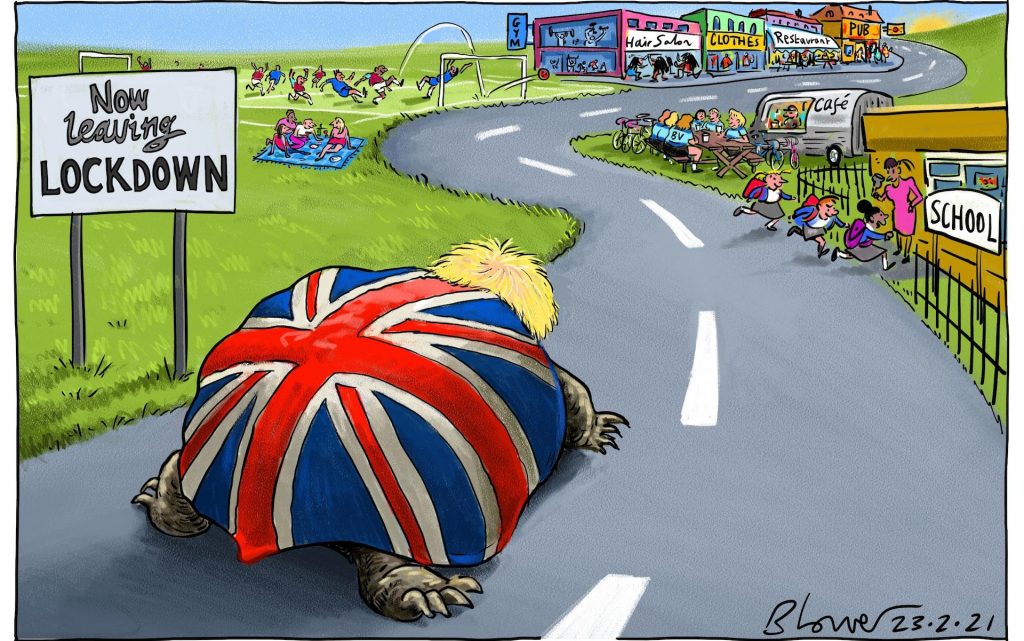
Yesterday, as expected, The Prime Minister held a press conference in Downing Street, flanked by Witless and Unbalanced, and unfolded his roadmap. As expected, it looks like it’s a map of pre-industrial Britain, with no motorways or even A roads to speak of. The journey is going to be slow, terribly long and the horse and cart may break down on the way. Isabel Hardman has written an explainer for the Spectator.
Step 1: From March 8th, people will still be instructed to stay at home, but schools and colleges will reopen, along with practical higher education courses. Face coverings should be worn in all indoor environments including schools unless two metre social distancing is possible… From March 29th there will still be no indoor mixing or holidays. People will be advised to minimise travel. The rule of six – or two different households – will return for outdoor mixing.
Step 2: No earlier than April 12th and at least five weeks after Step 1. Still no household mixing indoors. All retail, outdoor attractions such as zoos, libraries and community centres, personal care premises and outdoor hospitality will reopen. Indoor leisure such as gyms will open for individual or household group use. People will be able to stay away from home within the same household, and all children’s activities and indoor parent and child groups of up to 15 parents will reopen. Wakes and wedding receptions will widen up to 15 people.
Step 3: No earlier than May 17th and at least five weeks after Step 2. Indoor entertainment and indoor sports will reopen and a 30 person limit will apply outdoors. Outdoor entertainment such as performances can start along with some large events with capacity limits. The rule of six will now apply to indoor mixing. People will be able to travel overseas.
Step 4: No earlier than June 21st and at least five weeks after Step 3. Legal limits on social contact will lift and larger events allowed. Nightclubs will reopen
Hard not to be disappointed, given that Boris promised last year that it would all be over by Christmas. Does he now intend to under-promise, and over-deliver? One can but hope. At least Zero Covid appears to have been ditched, as Hardman points out.
The roadmap also covers what life with Covid as an endemic disease might look like. Ministers are opening four programmes of work to inform their policy on what ‘living with the virus’ will involve. These cover Covid status certification (the vaccine passport), large events, international travel and social distancing.
Worth reading in full.
Turning to the roadmap itself, it’s a long document, but here with a few ‘highlights’.
65. It is not currently known for how long people who receive a COVID-19 vaccine will be protected. This is because, as is the case with many vaccines, the protection they confer may weaken over time. It is also possible that new variants of the virus may emerge against which current vaccines are less effective. As well as working closely with manufacturers, Government scientists are seeking to better understand the impact of some Variants of Concern on the vaccines currently in deployment.
66. To ensure the country is prepared for these scenarios and while further evidence is gathered, the Government is planning for a revaccination campaign, which is likely to run later this year in autumn or winter. Any revaccination is likely to consist of a single ‘booster’ dose of a COVID-19 vaccine: the ideal booster may be a new vaccine specifically designed against a variant form of the virus. Over the longer term, revaccination is likely to become a regular part of managing COVID-19.
Moving on to the most politically sensitive bit:
Covid Status Certification
131: The Government will review whether COVID-status certification could play a role in reopening our economy, reducing restrictions on social contact and improving safety. This will include assessing to what extent certification would be effective in reducing risk, and the potential uses to enable access to settings or a relaxation of COVID-Secure mitigations. The Government will also consider the ethical, equalities, privacy, legal and operational aspects of this approach and what limits, if any, should be placed on organisations using certification. It will draw on external advice to develop recommendations that take into account any social and economic impacts, and implications for disproportionately impacted groups and individuals’ privacy and security. The Government will set out its conclusions in advance of Step 4 in order to inform the safe reopening of society and the economy.
What about football and travel?
Large Events
133) Over the spring the Government will run a scientific Events Research Programme. This will include a series of pilots using enhanced testing approaches and other measures to run events with larger crowd sizes and reduced social distancing to evaluate the outcomes. The pilots will start in April.
134) The Government will bring the findings from across different sectors and different settings to determine a consistent approach to lifting restrictions on these events. Depending on the outcome of this work, the Government hopes to be able to lift restrictions on these events and sectors as part of Step 4.
International Travel
135) The Government’s objective is to see a safe and sustainable return to international travel, for business and pleasure. When it is safe to do so the UK will again be the destination of choice for international visitors from around the world. In the short-term, the Government will continue to protect the vaccine rollout and mitigate against the risk posed by imported variants.
136) Vaccinations could offer a route to that safe and sustainable return. Once more is known about the evidence of vaccines on transmission and their efficacy against new variants, the Government can look to introduce a system to allow vaccinated individuals to travel more freely internationally.
137) The UK is working with other countries who have started similar programmes, to lead global efforts to adopt a clear international framework with standards that provide consistency for passengers and industry alike. The Government will make this a reality through ongoing work with the World Health Organisation and other multilateral organisations, the UK’s presidency of the G7 this year, and by working with other international partners.
138) However, any such system will take time to implement. It will be heavily dependent on improved scientific understanding about the role vaccination plays in reducing transmission. Introducing such a system also needs to be fair and not unduly disadvantage people who have yet to be offered – or gain access to – a vaccine. That being the case, the Government does not expect this solution to be available quickly, and restrictions like those in place across the world are likely to continue for the near future.
When can we ditch the masks and the stupid one-way systems in shops?
Social Distancing
145) Social distancing is difficult and damaging for businesses and, as a result, it is important to return to as near to normal as quickly as possible. Ahead of Step 4, as more is understood about the impact of vaccines on transmission and a far greater proportion of the population has been vaccinated, the Government will complete a review of social distancing measures and other long-term measures that have been put in place to limit transmission. The results of the review will help inform decisions on the timing and circumstances under which rules on 1m+, face masks and other measures may be lifted. The review will also inform guidance on working from home – people should continue to work from home where they can until this review is complete.
And finally, under the section marked long term:
Living with the virus
196) Like some strains of flu, COVID-19 is a relatively mild illness for much of the population, but it is more dangerous to vulnerable groups. The Government will ensure the country can live with the virus in the longer-term without imposing restrictions which bear heavy economic, social and health costs. The outcome of the four programmes of work set out in chapter 3 (large events, COVID-Certification, international travel and social distancing) will inform Government policy on living with the virus.
197) In addition to a comprehensive revaccination programme, set out in chapter 2, the Government will also use the Test, Trace and Isolate system to keep the virus in check. This includes regular asymptomatic testing in sectors with the highest risk of transmission, as well as testing in the workplace to help protect employees from infection and keep businesses open. The UK has already stepped up domestic production of lateral flow tests. As set out in chapter 2, the Government is also investing in bolstering domestic vaccine production capacity across the whole of the UK.
Worth reading in full – although, God knows, I cannot imagine more than about three people will.
Stop Press: The Telegraph reports that proposals for a major easing of lockdown before Easter were dropped after scientists warned the Government that it could lead to an extra 55,000 deaths. Thank you, SAGE.
Stop Press 2: Again in the Telegraph, Ross Clark notes the irony that we may be the first country to vaccinate its population but the last to reopen.
Stop Press 3: Watch Boris unveil his plan in the House of Commons yesterday.
The Ruination of Census 2021: An Unintended Consequence of Boris’s Glacial Reopening
A reader has flagged up an unintended consequence of the lengthy lockdown exit plan.
The Government has taken a blundering stride to repeating some of the planning mistakes of the current pandemic by telling public libraries they can’t reopen until April 12th.
By doing so, it will prevent library staff assisting in person anyone, notably those with poor English, completing their 2021 Census forms, even though they have been receiving training to do precisely that! This year, for the first time, the forms will be available online and the many people who still don’t have internet accesss at home will need to use a library PC to fill theirs in. Virtually all public libraries have PCs.
A high take-up rate for the once-a-decade census, whose accuracy is crucial for local and central government planning and prudent spending, is arguably even more important than the rate for vaccination, since everyone will benefit from the former while only the vulnerable truly need the latter.
It is disproportionately BAME people who will struggle to provide all the very detailed information that is required, and so go underreported, which will distort planning for a future pandemic. The failure to appreciate cramped living conditions, with more people living in homes than they were intended for, has accounted for very many Covid deaths as isolation was just about impossible and transmission hard to avoid. Hence the many instances of infections within the same family.
Putting your postcode in the search box here will produce many libraries as designated Support Centres, yet all are shown as closed. Very many are not even offering a telephone service. Some are offering email help – not much good if you don’t have digital access and an inefficient way to assist you if you do.
The ONS organises the Census on behalf of the Government and has been preparing the event for years. Will they be any more reliable with this than they are with the COVID-19 Infection Surveys they carry out every week, one wonders?
NB The online questionnaire goes live today (February 23rd) and completion is due by March 21st, the day for which all details should be valid.
P.S. It is still possible to request a printed copy, but some people are sure to not realise this. If a census helper knocks on their door (it’s not clear if they are even planning to visit people who haven’t returned their form), how likely are they to answer in the current climate of fear of strangers?
Another Reader Exchanges Emails With Neil Ferguson
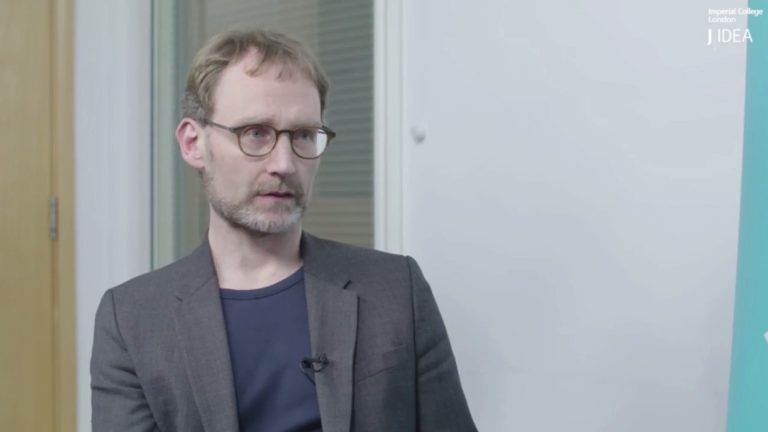
Following Professor Neil Ferguson’s email exchange with one of our readers, which we published in yesterday’s Lockdown Sceptics, another reader decided to email him. He again replied. Here is their exchange in full.
Neil,
Someone sent you an article written by Derek Winton and you replied to that person by sending him/her a handbook about conspiracy theories.
So – anyone who disagrees with you must be a conspiracy theorist? Is that it?
But the Derek Winton article made no reference at all to any conspiracy or conspiracy theory.
It is possible you know to take a different view from you without thinking that you are part of some conspiracy.
Your reply referred to above doesn’t come across at all well. You might want to consider proffering an apology for it.
All the best,
XXXX
The Professor replied, with a couple of references that suggest he may have Googled “Lockdown Sceptics” and “no Second Wave” or “Casedemic” before replying.
Dear XXXX,
Reductionist rhetoric such as “anyone who disagrees with you must be a conspiracy theorist?” rather makes my point. It is not just anyone.
Science is about alternative perspectives, debate and being prepared to change ones view. My views are driven by the data and analysis of it – not just that from Imperial, but from researchers globally. Like most other people working on the virus, I learn new things every week, and that sometime involves rejecting previous beliefs.
However, the Winton piece was an ideologically motivated rhetorical rant, not a serious scientific discussion. Criticising 15 year-old C code is never going to be scientifically persuasive, because the science never depended on that (or any other) code. Never mind the bizarre but persistent minority belief that the world locked down because of the results from one modelling study.
That post came from a mindset that has predetermined what the truth is, feels that the “mainstream” world is not listening, and seeks to use polemic rather than actual scientific research to change others’ minds. That ticks quite a few of the conspiratorial thinking boxes. Admittedly not to the same degree as the emails I receive accusing me of being a minion of Bill Gates in wanting to implant microchips in people. But that is not saying much.
That is not to say I don’t think it’s legitimate to disagree about whether the social and economic costs of Covid measures are “worth it”. Or indeed about whether compulsory measures or recommendations should have been adopted. Neither of those issues are fundamentally scientific ones.
What is dangerous “alternate reality” nonsense is using rhetoric and cherry-picking of the science to try to deny the threat posed by the virus. To give a couple of not too historic examples:
https://dailysceptic.org/2020/09/01/latest-news-121/
This last year has been a tragedy for the world, and the consequences will be with us for decades. The response of the scientific community has been a silver lining though. We have learned more about this virus in a shorter time than I could have conceived would be possible. That we have multiple vaccines now available is a remarkable achievement – and one which will benefit the control of many other diseases. And, unlike much of the rest of the response to the pandemic, that research has been a truly global and co-operative effort.
Instead of futilely trying to undermine the work of thousands here and abroad, perhaps try celebrating human ingenuity in the face of adversity. The pandemic has been a random, terrible event. It is no-one’s fault – and while every country has made mistakes, most decision-makers (and the doctors and scientists behind them) have been trying to do the best they can, faced with very difficult decisions.
Best,
Neil
Our reader then replied to him.
Dear Neil,
Thanks for your email in reply to mine. I am grateful to you for taking the time. I know you are busy.
Some lockdown sceptics have made predictions that haven’t come to pass. But is that not also true of Imperial College modelling as Derek Winton has said?
You may say that the reason your team’s BSE projection on which he comments never came to pass is because the Government of the day took the projections of that team seriously and took drastic measures to mitigate the disease’s impact.
But what about your telling the Guardian in 2005 that up to 200 million people could be killed by bird flu? Few precautionary measures were taken to mitigate the impact of Avian Flu and yet the number of deaths is a tiny fraction of that figure.
And in 2009 an Imperial College modelling team of which you were a member significantly over-estimated the likely death toll from Swine Flu.
Again nothing approaching a lockdown was imposed. I accept these things don’t mean your subsequent work should be dismissed, but by the same token I don’t think you can dismiss the central arguments of the lockdown sceptics – that the lockdown policy will ultimately do more harm than it prevents – just because some of their predictions turned out to be inaccurate.
Correct me if I have this wrong but I don’t think that the adverse health/educational/social/political/other effects of lockdown have featured in modelling with which you have been involved. Could be your view is that that’s not your bailiwick – is that how you see it?
(In fairness to you, I do see on looking again at your email to me that – whatever your modelling work says – you accept that there is room for debate on the question of the social and economic harms that Lockdown might cause – though you don’t refer to the harm to health it might/does cause.)
If you have a moment I’d love to know how you respond to the evidence that the most severe policies – such as stay-at-home orders and business closures – are not more effective at reducing overall transmission than the more modest policies put in place in countries like Sweden and South Korea. I’m thinking of the work of John Ioannidis and his colleagues at Stanford in particular.
In addition, there is the evidence that laypersons like me can see with our own eyes.
Such as the fact that Florida which didn’t lockdown again in the autumn/winter has a lower Covid death toll than some states that did and overall the average number of Covid deaths in those US states that haven’t issued stay-at-home orders is lower than in those that did.
Isn’t it at least arguable that had we kept to our Pandemic Preparedness Strategy we wouldn’t have significantly more Covid deaths than we’ve had in England after three lockdowns? And that we’d have far lower levels of collateral damage?
Some of the criticism directed at you is deplorable, vitriolic stuff which I find utterly unacceptable. Reprehensible in fact. I am not with the people who put out that kind of material.
I would like to see reasoned debate instead.
I would like to see you talking to Sunetra Gupta, Carl Heneghan and John Ioannidis for example.
In fact, I would love to see a proper grown up debate between the leading scientists on both sides of this issue on the BBC or Channel 4.
I bet if you proposed it to the Beeb they’d have a good look at putting it on. (I can’t know whether any of the people I refer to above would want to show up – don’t know them.)
Take it easy.
Many thanks.
Cheers,
XXXX
Professor Ferguson, who must, by this stage, have had a fairly good idea where his response was going to end up, replied:
Dear XXXX,
Can I point out that I never “predicted” 200m would be killed by bird flu. The Guardian article you refer to was reporting this Nature paper – https://www.nature.com/articles/nature04017
What we looked at was what might unfold if bird flu (H5N1) gained the ability to spread from person to person. A threat which still exists, but not something we can predict the likelihood of happening (or ever tried). As I explained to journalists at the time.
That paper was a small part of a global research effort to improve preparations for a novel influenza pandemic which was stimulated by the emergence of H5N1. Pandemic planning has been a top priority for the UK Government since that time, with a novel pandemic being top of the UK Government risk register.
In relation to Swine flu, I think you are referring to the Dept. of Health reasonable worst case planning scenario which was agreed by SAGE in 2009. Multiple groups input into that, and it was never a prediction (rather it was closer to the upper bound of a confidence interval) – as the name implies – given the data available in April 2009, it quantified the worst case the UK Government might need to plan for. As more data became available, the uncertainty range narrowed and the upper bound on the confidence interval came down, leading the RWC to be revised down. That is how science works.
I would also note that SAGE has never revised the RWC for Covid agreed last March, largely because the severity we estimated for the virus turned out, unfortunately, to be basically spot on.
Best,
Neil
Stop Press: It is now 20 years since 2001’s Foot and Mouth epidemic and to mark the occasion John Lewis Stempel has written an interesting piece in UnHerd.
The Conspiracy Theory Handbook: a Short Review
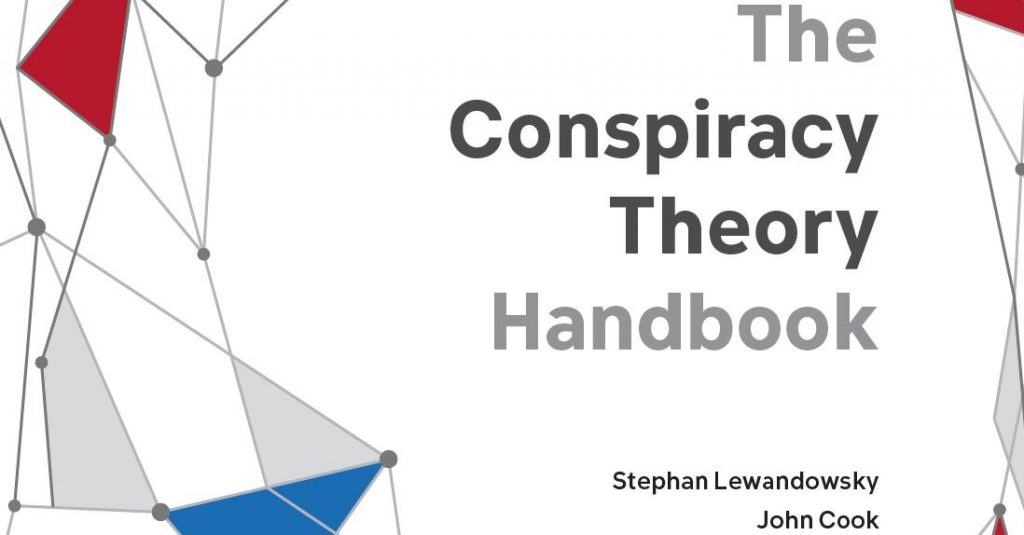
Professor Ferguson’s first email to a Lockdown Sceptics reader included this link (pdf) to The Conspiracy Theory Handbook by Stephan Lewandowsky and John Cook. This ruffled a few feathers. After all, who would want to be a conspiracy theorist? Brian Davey, who has read the book, has written an explainer for us.
There’s a lot about the Conspiracy Theory Handbook in today’s LS. A few months ago I wrote a critique of that text – it bugged me that conspiracy theorist had become a phrase that is a “thought stopper” or “thought terminating cliché” to discourage further reflection about a topic. No doubt this is because it used to be the case that conspiracy theorists theorised plots against the elite – e.g. assassination plots. However, from about Kennedy’s assassination onwards “conspiracy theorists” were people who explained events by claiming plots that were organised BY the elite against ordinary people (or against other elite factions).
In this regard, one of the things that really bugged me about Lewandowsky and Cook’s description of what they analyse as a new kind of “thought disorder” is that people who are “conspiracy theorists” have what L and C decide to be an “unreasonable degree of scepticism of official narratives”. However Lewandowsky and Cook do not calibrate that idea. In other words, they do not tell us what a reasonable degree of scepticism of official narratives would be. It is almost as if, in the world of L and C, there is no public relations industry and spin does not exist… Clearly it does. Indeed what Gary Sidley, with justice, complains about – that psychologists now direct the Government’s PR lockdown strategy by deliberately inflating fear and the use of shaming – is not really new. PR has used sophisticated psychological insights ever since Edward Bernays who was the nephew of Sigmund Freud. What is happening then is that many otherwise comfortable people are waking up in horror to find themselves on the receiving end of manipulative techniques that have been used for a very long time…
Needless to say, Lewandowsky and Cook have ignored my criticisms which were published by the Irish think tank Feasta.
In conclusion, the so-called “Great Reset” and building back better is a strategy of the global super elite to concentrate economic power and push through a technological and social agenda in response to climate change, biodiversity collapse and resource depletion plus the damage done to the biosphere that is spilling out in new diseases. A considerable part of the people who previously thought of themselves as part of the elite are finding that they are not part of the club and are suddenly outsiders… while the Neil Fergusons’s, Patrick Vallance and Chris Whittys of this world were in the right places at the right times with the connections to hitch a ride on the imaginary strategy of the super elite fantasists like Bill Gates. This elite strategy is not really a conspiracy because it is open and there is no secrecy about their techno fantasies – but people who oppose this delusionary vision of the future for one reason or another have the “thought stopper” conspiracy-theorist label thrown at them. In my view, the super elite strategy is pure fantasy but that’s another story…
A Family Note
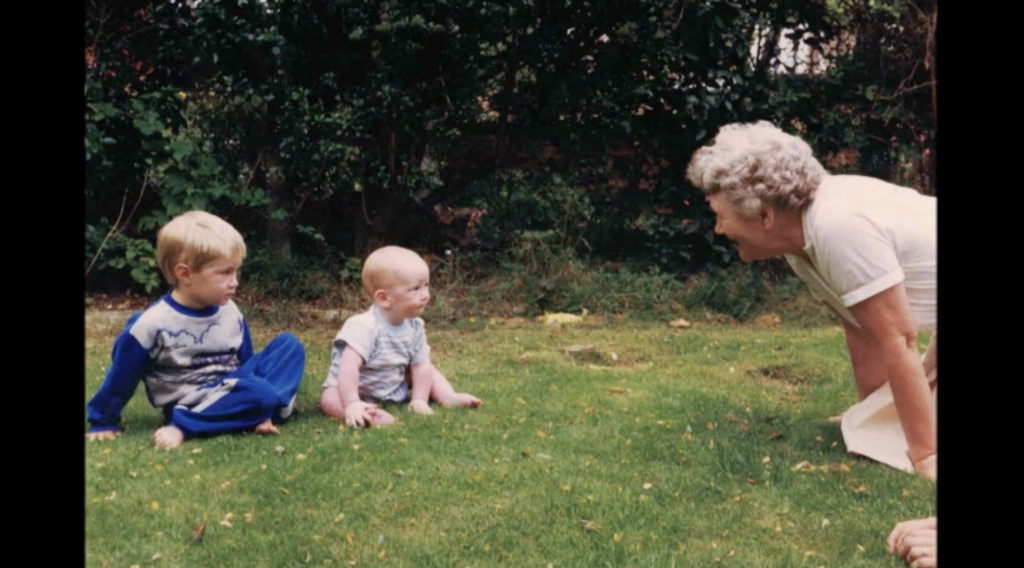
There follows a post by our regular contributor Guy de la Bédoyère with some sad family news.
This in normal times would be private but I think that under the circumstances it’s worth sharing because I doubt if my wife and I are alone and the point has far wider relevance.
On the night of February 21st/22nd my 100 year-old mother-in-law died in her care home. Although she had deteriorated physically she was mentally very alert and had no dementia. We had last seen her a few days earlier on one of the occasional ‘window visits’ we were permitted, and by today’s standards that was good fortune. She did not die of Covid and the doctor has confirmed that.
My mother-in-law’s long life included the deaths of two husbands and the even more tragic deaths of two of her three children, one as an infant in 1958 and about whom she still often talked. Thanks to the last year’s precautions her final 12 months of life meant that she never hugged or held her only surviving child again, she never saw her four great-grandchildren again and indeed never even met two of them thanks to Covid laws, and had only one or two fleeting visits from the three of her five grandsons who were able to travel from within the UK to see her back in the late summer and autumn. The two who live abroad of course were unable to come at any time in the last year.
She was acutely aware of what she had been denied for the sake of keeping her ‘safe’. I know there will be some who will respond by saying that the precautions over the last year have kept other people like her alive. And that is possibly true. However, the fact remains that people of very advanced ages are by definition not far from death, from whatever cause. For any one of them death can come without warning and they do not have time to spare. My mother-in-law was in her own way just as much a victim of Covid and its fall-out as those who died from the disease and I know she is far from alone.
So many elderly people, whatever the cause of death, Covid included, have spent their last months and weeks in brutal isolation in the name of keeping them safe.
That it has come to this, that we as a society and led by the Government and its scientific advisers with the willing acquiescence of organisations and individuals have done so much to commit the ultimate act of betrayal towards people at the end of their lives will surely go down in history as one of the most ignoble and demeaning aspects of this tragic year. There ought to have been a better way than that.
My mother-in-law’s last year of life was a hideous punishment. We can only console ourselves with the knowledge that her sadness, loneliness, and despair are over. We as a family, however, and especially my wife will be scarred forever by the experience. Boris’s lethargic lightening of the lockdown is of little use to us right now.
There will be a long time in which all of us will ruminate on the decisions made, but perhaps we can add my mother-in-law’s dismal last days to the ever longer list of things we should make sure never happen again.
Sunday in the Park With Rosie
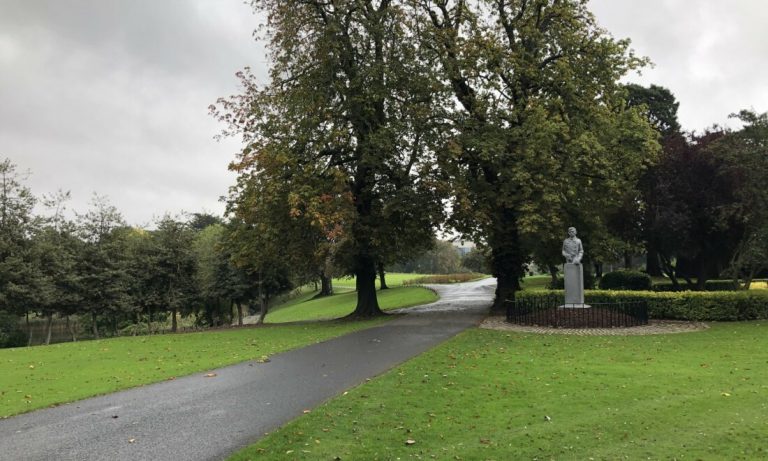
The weather was good on Sunday and so Lockdown Sceptics reader Rosie Langridge went for a walk in a nearby park, and saw people out, about and relaxed. The trip led her to put some thoughts together on what lockdown sceptics can do to try and help the country readjust to the old normal. It involves getting out and about, talking to people and making social life as ordinary as possible again. Quite simple really.
Sunday being warm and sunny, we set off for the park. Not sure if that was a reasonable excuse or if we were indulging in a criminal activity.
There were crowds of people looking relaxed. Lulled – almost – into a parallel universe where life is as it should be. I wandered through a wide open door into a spacious café and looked around at the piled up tables and chairs, the barricaded display of artwork for sale, and the paintings on the wall. I just ignored the ‘people’ lined up in their masks. The ethical case for expecting me to overcome my aversion is slim. They choose to do it, not me.
I’d entirely forgotten about the one-way system business, and was unaware that I’d come in at the ‘wrong door’. I made my way backwards up the queue until a big burly man moved to block my way and towered over me saying, “There’s a one-way system for a reason,” and then blamed me for having “forced” him to speak to me. His muzzle was bizarrely emblazoned with “Lest we forget”. I nearly managed to remain polite.
But standing there I realised what we lockdown sceptics need to be doing now – our civic duty is to go into public places and behave in an ordinary manner, to show people that human interaction isn’t dangerous, and to re-accustom people to the sight of a human face. Go out and make our parks and streets crowded.
So, having recovered my aplomb, I fixed a cheery smile to my face and set off on our walk, exchanging nods and smiles with anyone who was ready to do so. And there were a lot of people out. It was lovely to see. I exchanged comments along the lines of, “Such a lovely day”, “So lovely to see the children having fun” (NB important!) – plus a few longer exchanges, taking opportunities where I could to talk about the issue of the day.
As an older woman was giving me advice, the man standing by replied that we are in unprecedented times with the pandemic. I said: “What pandemic? We’ve had flu and cold viruses all this time and there’s nothing different about a coronavirus.” The man walked off without even hearing me out. I’m still trying to think of a better reply to the “Unprecedented Times” meme but at least the woman heard my views.
Worth reading in full.
Postcard From the Philippines
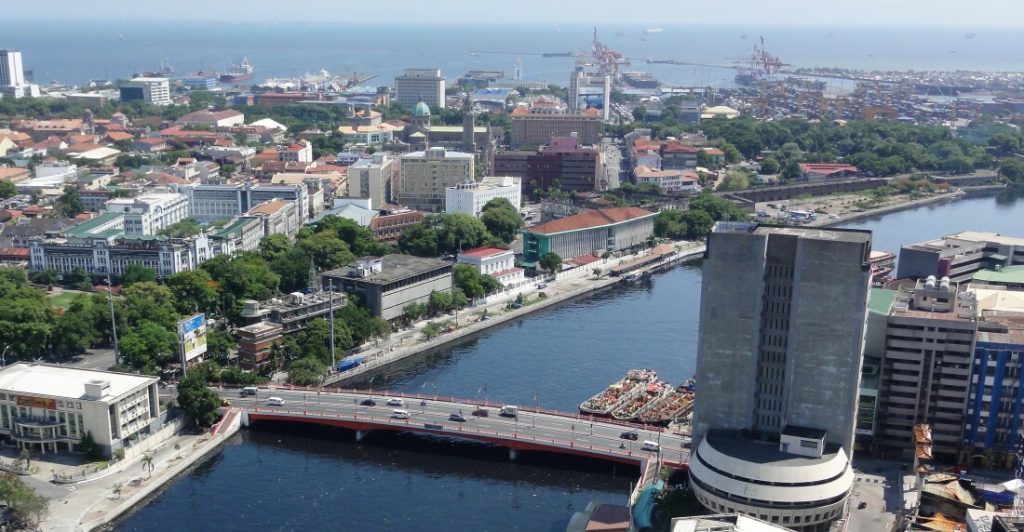
We’ve been sent another Postcard! This one comes to us from Kyle Helke in Manilla, which has endured one of the longest and strictest lockdowns seen anywhere in the world. From the sound of it, they have done everything we have here, only more so and worse. Here is an extract:
Having lived in both New York and Italy during this time, I thought I had seen it all when it came to lockdown absurdity, but the Philippines are on a whole different level. Upon arrival, you are subjected to a PCR test and then sent to a hotel to quarantine (both at your expense). When we arrived, you were able to leave the hotel and go home to do your mandatory two-week quarantine after receiving your negative test result, but now they don’t even let you do that anymore; you have to remain at the hotel for the two-week duration. We were lucky to be able to move into our employer-provided housing during this time period, but getting food and taking care of other tasks was very difficult. I hate to think of how the less fortunate here manage in the same situation.
Regulations are stricter in Manila because it is the most populated region in the country. Face masks and face shields are mandatory when leaving your home, and you are subjected to temperature checks pretty much everywhere. There has been some push for people to use contact tracing apps, but because there are a plethora of them and the contact tracing system is not really standardised, it’s just really a formality. Most of the time when you enter a restaurant you can opt out of scanning the QR code or using the tracing app and just fill out your information on a sheet of paper. The culture here is one of compliance and rule-following, so no one really cares about the contact tracing stuff as long as they are seen to be following the rules. But, like many developing countries, the rules change frequently and without notice, so because of that everyday is a surprise. In November, we were allowed to bring our toddler to the grocery store; in December, that privilege was rescinded without public notice. One day there are one-way schemes on sidewalks with security admonishing violators by waving a compliance sign in their faces, the next week it could be like none of it ever happened.
The most grievous offence in this country, in my opinion, is the war the Philippine government has waged on children. Mask and face shield mandates are applicable for children two years and up. Children under 15 are technically not allowed to even leave the house, but this is such a young society that a blind eye is often turned on this regulation. For the longest time children under 18 were not allowed out, but I think in recent months the government is realising how unfeasible it is to keep working-age children at home, and they have reduced the age restriction to 15. However, children are still barred from restaurants, malls, and similar commercial establishments. Naturally, this also means children are not allowed in school, as it has been the case since March when the lockdown began. All learning is either done online, or, for public schools, through textbooks and workbook exercises that the schools drop off and pick up monthly at each family’s home. Every now and then there are a few articles in the news about getting kids back in schools, but I think this is just to placate the public; most people think this situation will go on until the end of the school year, and even into the next. All of this, of course, because the Government here – with the support of the Philippine Pediatric Society – is convinced that children are asymptomatic ‘superspreaders’ and therefore a grave threat to public health, which they base on numerous ‘scientific studies’. At this point, this country is one of the few in the world where children are not in some type of in-person school. How the Government here can know this and not be consumed by embarrassment and shame is beyond me.
This is an excellent postcard. Worth reading in full.
Round-up
- “There is no logical reason why UK holidays cannot restart immediately” – Self-catering holidays are zero risk, and would lift the gloom, writes Oliver Smith in the Telegraph
- “‘The vaccine is supposed to let us live’: Travel leaders call for an end to draconian restrictions” – The Telegraph has assembled the views of a group of tour operators and hoteliers, all calling for the Government to be bolder
- “Why isn’t Matt Hancock in jail?” – Will Havelock, writing in CAPX, provides more detail on the recent court judgement that found Matt Hancock has acted unlawfully
- “Should spreading anti-vaccine misinformation be criminalised?” – The BMJ debates whether the deliberate spreading of vaccine misinformation should be criminalised. 61% of BMJ readers say ‘yes’
- “Open letters from the UK Medical Freedom Alliance” – The UK Medical Freedom Alliance has published a number of interesting letters, most recently to the PM and senior ministers about mask mandates, and to Piers Morgan about his recent tweeting on the subject of vaccine passports
- “Britain Is Entering a Parallel Universe” – In a column for Bloomberg Opinion, Niall Ferguson says that Philip Pullman’s novels are an intimation of the post-pandemic world.
- “We’ve sacrificed a lot of our freedoms and a lot aren’t coming back” – More plain speaking from Peter Hitchens in his latest discussion with Mike Graham on talkRADIO
- “Dr Mark Changizi on Escape from Lockdown” – In the latest edition of the Escape from Lockdown podcast, Alex talks with theoretical cognitive scientist Dr Mark Changizi about why governments have been so determined to lockdown their citizens
- “Germans are turning down Oxford-AstraZeneca Covid vaccine” – Germany’s vaccination programme is in trouble, with people failing to keep their appointments for the Oxford Astrazeneca vaccine, according to the Times
- “Costs are rising exponentially for Europe’s disinformation war on vaccine science” – Europe’s coolness on vaccines makes the restructuring of some eurozone debt inescapable, writes Ambrose-Evans Pritchard in the Telegraph
- “Quebec actress dies while waiting for surgery delayed by COVID-19” – A tragic story reported in the Montreal Gazette
- “‘There’s no other option’: Toronto restaurant owner vows court action over extended lockdown” – CTV News reports the case of Adam Skelly, who is challenging the lockdown rules in the Ontario superior court
- “Dutch restaurant group suing state over Covid closures” – RT reports that the largest restaurant association in the Netherlands is set to embark on legal action to get the Government to drop its Covid restrictions due to their devastating impact on hospitality
- “Medical Censorship and Harms of Lockdowns” – Watch three Canadian doctors speak out about COVID-19 and the harms of lockdown
- “Declining a COVID-19 Vaccine Risks Penalties in Some Countries” – The Wall Street Journal details the price paid for refusing the vaccine in some countries around the world
- “The ‘Vaccine Passport’ Agenda” – The Swiss Doctor takes on vaccine passports
- “The Florida Versus California Showdown” – The two states provide a clear example of the dubious efficacy of COVID-19 lockdowns, writes Amelia Janaskie on the AIER blog
- Listen to publican Adam Brooks pleading for pubs to reopen sooner than May 17th
Theme Tunes Suggested by Readers
Sixteen today: “Mixed Signals” by Robbie Williams, “Roadmap to Revolution” by Oceans on Mars, “From Safety to Where” by Joy Division, “Fear Loves This Place” by Julian Cope, “I Won’t Back Down” by Tom Petty and the Heartbreakers, “Big A, Little A” by Crass, “Mighty and Superior” by Conflict, “What’s Another Year” by Shane MacGowan, “A History of Bad Men” by the Melvins, “We Gotta Get Out Of This Place” by the Animals, “Detention Home” by the Dead Boys, “Ain’t Nothing To Do” by Dead Boys, “Road to Ruin” by the Libertines, “Storm the Reality Asylum” by Rip Rig and Panic, “People Have The Power” by Patti Smith and “Running Scared” by Roy Orbison
Love in the Time of Covid

We have created some Lockdown Sceptics Forums, including a dating forum called “Love in a Covid Climate” that has attracted a bit of attention. We have a team of moderators in place to remove spam and deal with the trolls, but sometimes it takes a little while so please bear with us. You have to register to use the Forums as well as post comments below the line, but that should just be a one-time thing. Any problems, email Lockdown Sceptics here.
Sharing Stories
Some of you have asked how to link to particular stories on Lockdown Sceptics so you can share it. To do that, click on the headline of a particular story and a link symbol will appear on the right-hand side of the headline. Click on the link and the URL of your page will switch to the URL of that particular story. You can then copy that URL and either email it to your friends or post it on social media. Please do share the stories.
Social Media Accounts
You can follow Lockdown Sceptics on our social media accounts which are updated throughout the day. To follow us on Facebook, click here; to follow us on Twitter, click here; to follow us on Instagram, click here; to follow us on Parler, click here; and to follow us on MeWe, click here.
Woke Gobbledegook
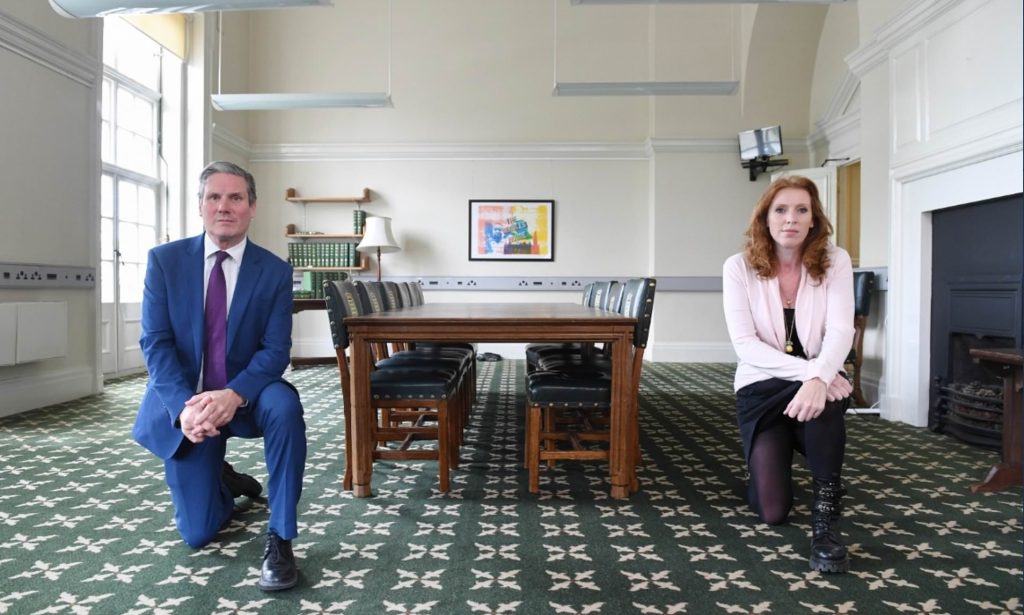
We’ve decided to create a permanent slot down here for woke gobbledegook. Today, we bring you a hitherto under-considered method of reducing the COVID-19 infection rate in the US: Reparations for Slavery. Happily a peer-reviewed study by researchers from the Harvard Medical School has now hit upon this solution as Cockburn notes in Spectator US.
To defeat coronavirus, America didn’t need a vaccine. It just had to pay every black person in the country $250,000.
This remarkable finding comes from the intrepid minds of Harvard Medical School. In their paper, 11 elite health professionals claim that reparations for slavery would have radically reduced US infections and death rates from coronavirus.
To reach its conclusion, the study compares coronavirus infection rates in Louisiana with the country of South Korea, where coronavirus was largely quashed. Now, Cockburn can think of many differences between South Korea and Louisiana – he has never thrown up into a garbage can in Seoul, for starters – but for all their PhDs Harvard’s experts are remarkably simpleminded on the topic. The paper says nothing about South Korea’s conformist culture, its intense xenophobia, its high education levels, or its low obesity rate. No, it’s the equity, stupid: South Korea is more equal than Louisiana. It didn’t have slavery. So a few hundred thousand in reparations and Louisiana would be just like South Korea.
The paper’s scientific pretensions fray towards the end, when its authors collectively turn toward the reader and tell them that, if they want to reopen the country without erecting socialism, they might as well bring back Jim Crow:
“Since reparations have not been enacted, however, ‘reopening’ American society early (after coronavirus-forced shutdowns) had a disproportionate adverse mortality effect on Black people, an effect that was predictable. Therefore, de facto, it resembles a modern Tuskegee experiment, since massive wealth redistribution could have averted these deaths, just as penicillin to treat syphilis would have averted deaths in the nearby state of Alabama.“
That’s some real science right there. Would one-off reparations payments really change American inequality long-term? How can anyone possibly predict the sociopolitical ramifications of the most dramatic wealth transfer in the history of the United States? Isn’t it irresponsible and an abuse of the scientific method to create a ‘model’ where virtually every variable is simply made up?
Stop Press: Merseyside Police has apologised after driving through Wirral with a poster on a van proclaiming that “being offensive is an offence”. from the BBC.
Merseyside Police has apologised for claiming “being offensive is an offence” as part of a campaign to encourage people to report hate crime.
The force came under fire over the weekend after the message appeared on a billboard in Wirral.
It has since clarified that while hate crime is an offence, “being offensive is not in itself an offence”.
A spokesman added the poster was “well intentioned” by the local policing team in Wirral but it was “incorrect”.
The message on the billboard sparked criticism over whether being offensive constituted a crime.
The Telegraph also has a report of the episode in which Toby is quoted:
It’s deeply alarming that Merseyside Police have such a poor grasp of the law. As Lord Justice Sedley said in a landmark case in 1999, “Free speech includes not only the inoffensive but the irritating, the contentious, the eccentric, the heretical, the unwelcome and the provocative provided it does not tend to provoke violence. Freedom only to speak inoffensively is not worth having.”
The Free Speech Union has written to Merseyside Police asking for assurance that they have not interviewed or arrested anyone for this imaginary crime.
Needless to say, Titania McGrath was thrilled to discover that being offensive is now a criminal offence.
Stop Press 2: The Salisbury Review has a good think piece on the Nigerian actress who was was dropped from her role as Celie in the musical version of The Colour Purple after another actor dug up a five year-old Facebook post in which, as a Christian, she had expressed her view that homosexuality is a sin.
Stop Press 3: We do, occasionally, like to post links to arguments being made by people on the other side of the aisle. Responding to Gavin Williamson’s recent proposals for strengthening free speech protections in universities, Arianne Shahvisi argues that the Goverment has conjured up an imaginary problem to distract its supporters from its abject failures of the past 12 months.
“Mask Exempt” Lanyards
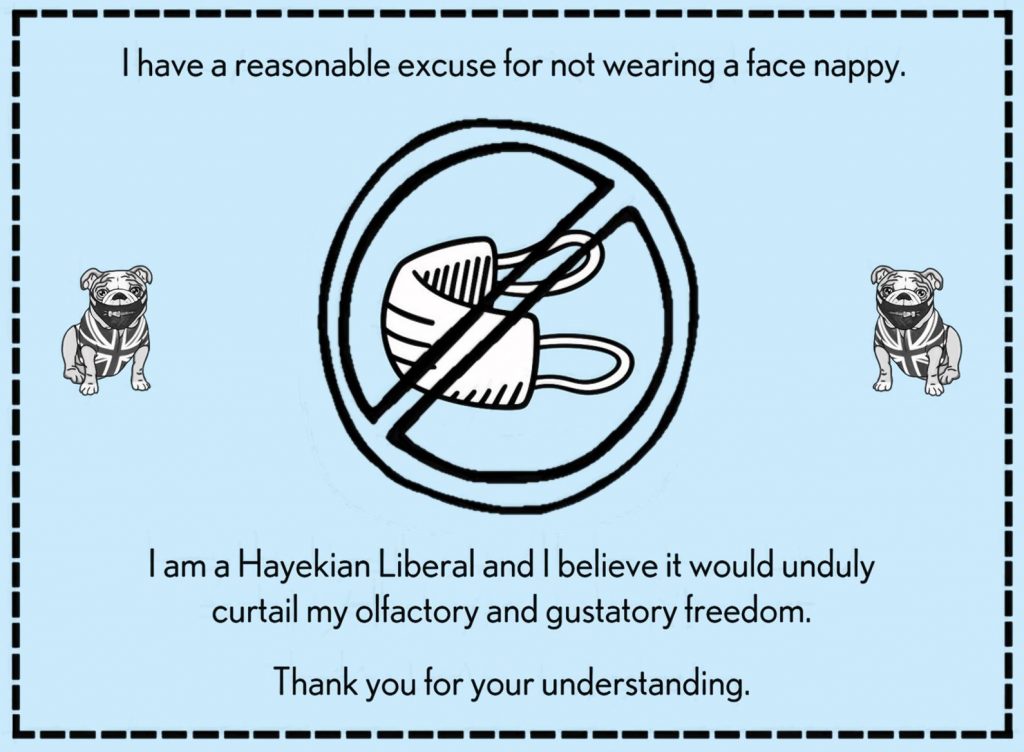
We’ve created a one-stop shop down here for people who want to obtain a “Mask Exempt” lanyard/card – because wearing a mask causes them “severe distress”, for instance. You can print out and laminate a fairly standard one for free here and the Government has instructions on how to download an official “Mask Exempt” notice to put on your phone here. And if you feel obliged to wear a mask but want to signal your disapproval of having to do so, you can get a “sexy world” mask with the Swedish flag on it here.
A reader has started a website that contains some useful guidance about how you can claim legal exemption. Another reader has created an Android app which displays “I am exempt from wearing a face mask” on your phone. Only 99p.
If you’re a shop owner and you want to let your customers know you will not be insisting on face masks or asking them what their reasons for exemption are, you can download a friendly sign to stick in your window here.
And here’s an excellent piece about the ineffectiveness of masks by a Roger W. Koops, who has a doctorate in organic chemistry. See also the Swiss Doctor’s thorough review of the scientific evidence here and Prof Carl Heneghan and Dr Tom Jefferson’s Spectator article about the Danish mask study here.
Stop Press: Boris’s roadmap involves secondary school pupils wearing masks in classroom. A senior teacher at school in London has sent us some thoughts.
It was already clear in the autumn term that the wearing of masks in the corridors and communal spaces had the effect of maintaining the idea that there was a crisis. Seeing hordes of kids with masks over their faces was a genuinely dystopian sight. But at least we didn’t have to put up with that nonsense in the classroom. Now, it seems, we do. Put aside for a moment the peculiarity of insisting on a further restrictive measure as part of your ‘roadmap’ out of lockdown, and at a time when you are trumpeting the success of the vaccines. The real nightmare is the de-humanising effect that masks have. To obscure the bulk of your face in an environment that is meant to encourage social participation is the worst possible measure. If you want to reduce your children to suppressed, voiceless drones, then masking them up is the best way to do it. Ignore for a moment the health hazards of an increasingly damp, germ filled bit of material across your respiratory systems all day long. Ignore, if you can, the environmental knock-back of millions of disused, disposable masks. What the mask really does is symbolise your liability as a human being. Only by somehow becoming less human are you allowed to exist in the Covid-mad world, and masking in classrooms will bring that message home to school pupils better than anything else.
Boris Johnson and his inadequate crew of wilting ministers may have added the mask mandate for classrooms as a further sop to the anti-education teaching unions. For them, it is just another minor measure in the destruction of society that they are so determined to achieve. For children in school, they may start to wonder whether the return was really worth it, as they exchange a screen for a mask and get no nearer to proper human interaction.
The Great Barrington Declaration
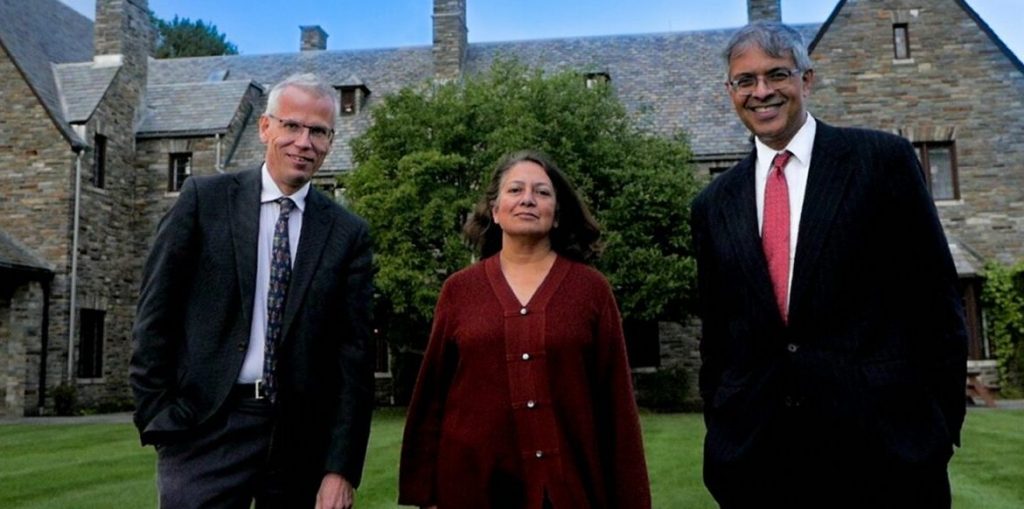
The Great Barrington Declaration, a petition started by Professor Martin Kulldorff, Professor Sunetra Gupta and Professor Jay Bhattacharya calling for a strategy of “Focused Protection” (protect the elderly and the vulnerable and let everyone else get on with life), was launched in October and the lockdown zealots have been doing their best to discredit it ever since. If you googled it a week after launch, the top hits were three smear pieces from the Guardian, including: “Herd immunity letter signed by fake experts including ‘Dr Johnny Bananas’.” (Freddie Sayers at UnHerd warned us about this the day before it appeared.) On the bright side, Google UK has stopped shadow banning it, so the actual Declaration now tops the search results – and Toby’s Spectator piece about the attempt to suppress it is among the top hits – although discussion of it has been censored by Reddit. In February, Facebook deleted the GBD’s page because it “goes against our community standards”. The reason the zealots hate it, of course, is that it gives the lie to their claim that “the science” only supports their strategy. These three scientists are every bit as eminent – more eminent – than the pro-lockdown fanatics so expect no let up in the attacks. (Wikipedia has also done a smear job.)
You can find it here. Please sign it. Now over three quarters of a million signatures.
Update: The authors of the GBD have expanded the FAQs to deal with some of the arguments and smears that have been made against their proposal. Worth reading in full.
Update 2: Many of the signatories of the Great Barrington Declaration are involved with new UK anti-lockdown campaign Recovery. Find out more and join here.
Update 3: You can watch Sunetra Gupta set out the case for “Focused Protection” here and Jay Bhattacharya make it here.
Update 4: The three GBD authors plus Prof Carl Heneghan of CEBM have launched a new website collateralglobal.org, “a global repository for research into the collateral effects of the COVID-19 lockdown measures”. Follow Collateral Global on Twitter here. Sign up to the newsletter here.
Judicial Reviews Against the Government

There are now so many legal cases being brought against the Government and its ministers we thought we’d include them all in one place down here.
The Simon Dolan case has now reached the end of the road. The current lead case is the Robin Tilbrook case which challenges whether the Lockdown Regulations are constitutional, although that case, too, has been refused permission to proceed. There’s still one more thing that can be tried. You can read about that and contribute here.
The GoodLawProject and three MPs – Debbie Abrahams, Caroline Lucas and Layla Moran – brought a Judicial Review against Matt Hancock for failing to publish details of lucrative contracts awarded by his department and it was upheld. The Court ruled Hancock had acted unlawfully.
Then there’s John’s Campaign which is focused specifically on care homes. Find out more about that here.
There’s the GoodLawProject and Runnymede Trust’s Judicial Review of the Government’s award of lucrative PPE contracts to various private companies. You can find out more about that here and contribute to the crowdfunder here.
Scottish Church leaders from a range of Christian denominations have launched legal action, supported by the Christian Legal Centre against the Scottish Government’s attempt to close churches in Scotland for the first time since the the Stuart kings in the 17th century. The church leaders emphasised it is a disproportionate step, and one which has serious implications for freedom of religion.” Further information available here.
There’s the class action lawsuit being brought by Dr Reiner Fuellmich and his team in various countries against “the manufacturers and sellers of the defective product, PCR tests”. Dr Fuellmich explains the lawsuit in this video. Dr Fuellmich has also served cease and desist papers on Professor Christian Drosten, co-author of the Corman-Drosten paper which was the first and WHO-recommended PCR protocol for detection of SARS-CoV-2. That paper, which was pivotal to the roll out of mass PCR testing, was submitted to the journal Eurosurveillance on January 21st and accepted following peer review on January 22nd. The paper has been critically reviewed here by Pieter Borger and colleagues, who also submitted a retraction request, which was rejected in February.
And last but not least there was the Free Speech Union‘s challenge to Ofcom over its ‘coronavirus guidance’. A High Court judge refused permission for the FSU’s judicial review on December 9th and the FSU has decided not to appeal the decision because Ofcom has conceded most of the points it was making. Check here for details.
Samaritans

If you are struggling to cope, please call Samaritans for free on 116 123 (UK and ROI), email jo@samaritans.org or visit the Samaritans website to find details of your nearest branch. Samaritans is available round the clock, every single day of the year, providing a safe place for anyone struggling to cope, whoever they are, however they feel, whatever life has done to them.
Shameless Begging Bit
Thanks as always to those of you who made a donation in the past 24 hours to pay for the upkeep of this site. Doing these daily updates is hard work (although we have help from lots of people, mainly in the form of readers sending us stories and links). If you feel like donating, please click here. And if you want to flag up any stories or links we should include in future updates, email us here. (Don’t assume we’ll pick them up in the comments.)
And Finally…
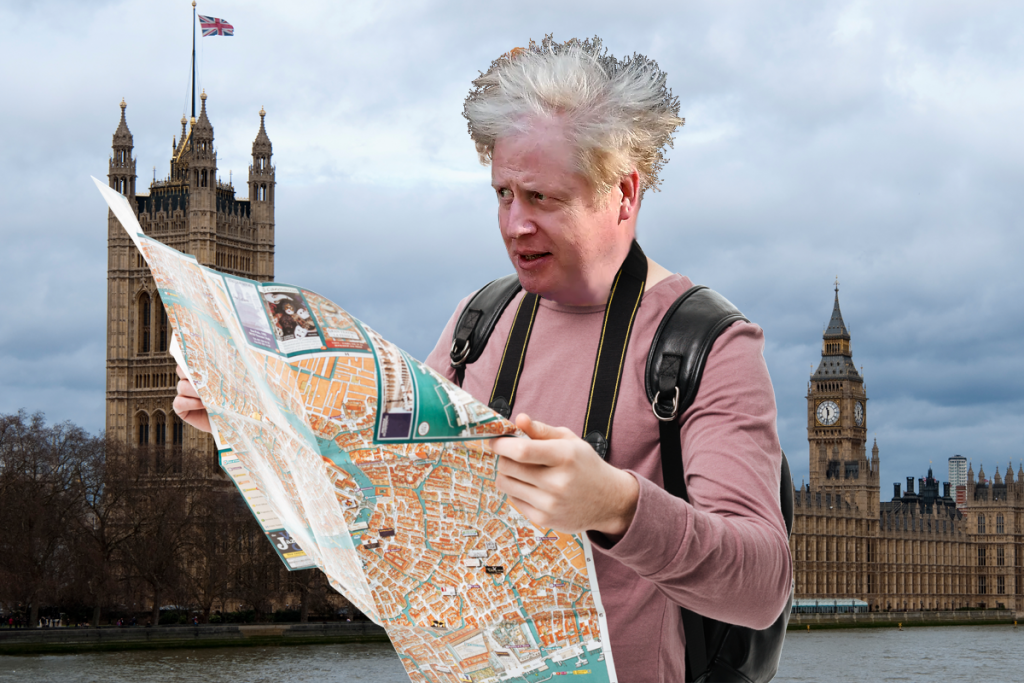
London Calling is back! After a one-week hiatus due to technical difficulties (one of them forgot to press the record button), Toby and James Delingpole are back to have a good old moan about the roadmap, Harry and Meghan’s ungracious exit from the Royal Family and the horrors of children having to wear masks in schools.
You can listen to the podcast here and subscribe on iTunes here.

 >>
>>

 (@Unlocked_UK_)
(@Unlocked_UK_) 











To join in with the discussion please make a donation to The Daily Sceptic.
Profanity and abuse will be removed and may lead to a permanent ban.